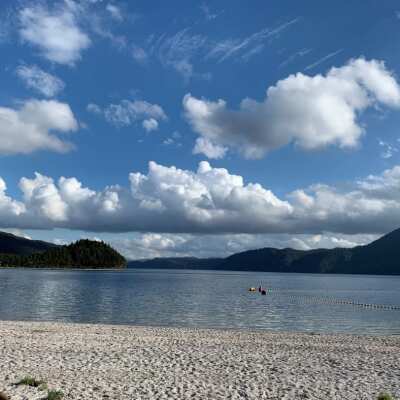
31 October 2023
The temporary closure of Rotorua’s Lake Ōkataina will be extended for another two weeks to allow for the installation of greater protection measures against the invasive gold clam.
The Ministry for Primary Industries (MPI) plans to establish a wash station at the lake, located about 24km from the city. It also looked at other sites to install wash stations for boats and trailers entering the Rotorua area.
Biosecurity New Zealand announced the culturally significant and popular trout fishing Lake Ōkataina would be closed, under the Biosecurity Act, to boating and fishing for a month at the beginning of October to install protections against the freshwater gold clams.
The announcement was made just days before the trout fishing season was set to open.
The decision was in response to Ngāti Tarāwhai Iwi Trust’s urgent bid to protect the lake, fearing if the clams reached its waters they would cause “irreparable and irreversible damage” to native flora and fauna.
Gold clams, also known as Asian clams, were believed to have been in the Waikato River for at least two or three years but were discovered in May. Fast reproducers, they have multiplied to be found in a 99km stretch, but have not been found elsewhere in New Zealand.
Eradication has never been achieved overseas but efforts have begun to stop the clams spreading from Waikato.
In a press release, MPI said it was working to put in a wash station on Lake Ōkataina Rd and working through “required approvals”.
When the wash station is in place, the forest-ringed lake with only one entrance would open to fishing and boating.
“We realise that fishers and boaties will be keen to get back on the water, and we appreciate their understanding while we put these protections in place.”
The release stated the government agency met with representatives of Fish & Game, Te Arawa Lakes Trust, Ngāti Tarāwhai Iwi and the local council this morning to let them know about the extension and to discuss resourcing the wash station.
It said it regularly spoke with response partners and key stakeholders, working together on practical measures to contain the clam.
MPI was also looking at other sites to install wash stations for boats and trailers to be cleaned as they entered the Rotorua area.
Those travelling from Waikato to the Te Arawa lakes area, including Ōkataina, will need to meet Check Clean Dry requirements for freshwater gold clam before going in the water.
Lake Ōkataina holds cultural significance to local iwi Ngāti Tarāwhai because it contains a drowned pa site and other submerged Māori archaeological features.
It’s popular with trout fishers, many from the Waikato.
In a desperate attempt to protect the lake, Ngāti Tarāwhai hired security and put large boulders on the ramps to ensure everyone knew about the closure, and were educated on the devastating impact of the clams.
A permanent wash station is installed and operational at the Mighty River Domain on the shore of Lake Karāpiro by the main boat ramp, mainly used by power boats and jetskiers, the MPI release said.
The station has a pressure sprayer so boaties blast their craft with water, removing young clams with mucous strands.
MPI have been exploring options for further wash stations in Waikato and the Bay of Plenty.
Before moving between waterways you must do the following for all gear that comes into contact with water:
Check
Remove any plant matter and leave it at the site (the river or lake bank), or put it in the rubbish. Don’t wash it down any drain.
Clean
Dishwashing detergent is not effective against gold clams, but hot water is.
For absorbent material, such as lifejackets or clothing, wash with hot water above 60C for at least 1 minute; between 50-54C (hot household tap water) for at least 5 minutes; or above 45C for at least 20 minutes. Alternatively, soak items in a 10 per cent bleach solution.
Dry
Ensure gear is completely dry to touch, inside and out, then leave to dry for at least another 48 hours before using it.
Source: mpi.govt.nz